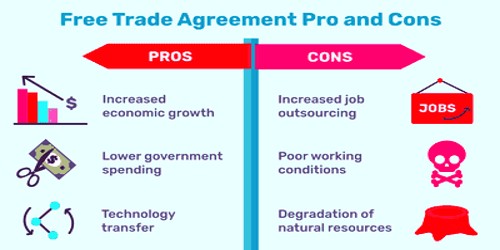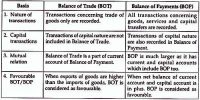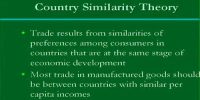The unrestricted purchase and sale of goods and services between countries without the imposition of constraints such as tariffs, duties, and quotas. Free trade is a win-win proposition because it enables nations to focus on their core competitive advantage(s), thereby maximizing economic output and fostering income growth for their citizens. It is a form of business strategy that allows traders to proceed and execute without intervention from the government. Protectionism is the economic policy of restraining trade between states (countries) through methods such as tariffs on imported goods, restrictive quotas, and a variety of other government regulations designed to allow (according to proponents) fair competition between imports and goods and services produced domestically.
Arguments against Free Trade –
- Infant Industry Argument.
If developing countries have industries that are relatively new, then at the moment these industries would struggle against international competition. However, if they invested in the industry then in the future they may be able to gain Comparative Advantage.
- This shows that comparative advantage can change over time.
Therefore protection would allow them to progress and gain experience to enable them to be able to compete in the future. Thus, an unfair and cut-throat competition develops between domestic and foreign industries.
- More on infant industry argument/ The Senile industry argument.
If industries are declining and inefficient they may require a large investment to make them efficient again. Protection for these industries would act as an incentive for firms to invest and reinvent themselves. However, protectionism could also be an excuse for protecting inefficient firms.
- To diversify the economy
Many developing countries rely on producing primary products in which they currently have a comparative advantage. However, relying on agricultural products has several disadvantages.
- Prices can fluctuate due to environmental factors
Goods have a low-income elasticity of demand. Therefore with economic growth demand will only increase a little.
- Raise revenue for the government.
Import taxes can be used to raise money for the government however this will only be a relatively small amount of money.
- Help the Balance of Payments
Reducing imports can help the current account. However, in the long term, this is likely to lead to retaliation.
- Cultural Identity
This is not really an economic argument but more political and cultural. Many countries wish to protect their countries from what they see as an Americanization or commercialization of their countries.
- Protection against dumping
The EU sold a lot of its food surplus from the CAP at very low prices on the World market. This caused problems for world farmers because they saw a big fall in their market prices. A country may face economic depression if its international trading partner suffers from it.
- Environmental
It is argued that free trade can harm the environment because LDC may use up natural reserves of raw materials to export. Also, countries with strict pollution controls may find consumers import the goods from other countries where legislation is lax and pollution allowed.
However, supporters of free trade would argue that it is up to individual countries to create environmental legislation.
The ways of implementation through tariffs quotas and embargo –
Tariffs:
- Reducing, import and export.
- Increasing product price.
- Deduce to consume a foreign product.
- Increasing production of an alternative domestic product.
Quota:
- Helps to protect dumping policy.
- Direct restriction on import and export.
- It maintains good relation with reducing import.
Embargo:
- Increasing custom tax.
- Decreasing import and export.
















